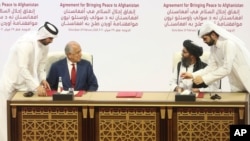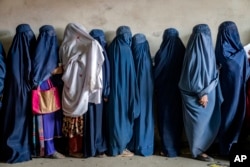Four years after the signing of the Doha agreement, the U.S. and Taliban accuse each other of violating its terms, while analysts say that the agreement was “flawed” and has had “disastrous” outcomes for Afghans.
“The Taliban have not fulfilled their commitments in the Doha agreement,” White House press secretary Karine Jean-Pierre said Wednesday in a news briefing in response to a question from VOA’s Afghan Service.
“The Taliban have also not fulfilled their Doha commitment to engage in meaningful dialogue with fellow Afghans leading to a negotiated settlement, an inclusive political system,” she said.
After seizing power in 2021, the Taliban established an all-male Taliban caretaker cabinet and rejected calls to form an inclusive government.
Jean-Pierre added that the U.S. would hold the Taliban to their commitment and work “tirelessly every day to ensure that this set of commitments is fulfilled.”
The Taliban, however, accused the U.S. of “violating” the agreement.
“If you have read the agreement, it is written that the U.S. would normalize its relations with the future government in Afghanistan, remove the sanctions and restrictions, and cooperate, which [the U.S. does] not,” spokesperson Zabihullah Mujahid said Thursday in an interview with state-run TV in Afghanistan.
Mujahid, however, said that the two main objectives — the U.S. withdrawal and not allowing anyone to use Afghan soil against the U.S. and its allies — have been implemented.
The U.S.-Taliban peace deal, signed in Doha, Qatar, on February 29, 2020, paved the way for the withdrawal of U.S. troops from Afghanistan.
The agreement obliged the Taliban to cut their ties with al-Qaida and other terrorist groups and participate in intra-Afghan peace talks to decide on “the future political map of Afghanistan.”
Retired U.S. General David Petraeus, who served as the commander of U.S. forces in South Asia and then as director of the CIA, told VOA that the Taliban obviously had not complied with the deal.
“If they had, the leader of al-Qaida wouldn’t have been a couple of blocks from the presidential palace, in a building controlled by the Taliban in Kabul, the capital ... despite the promise in the agreement not to allow them back on Afghan soil,” he added.
He said that the outcome of the implementation of the agreement was “very tragic, heartbreaking and disastrous,” as since the Taliban takeover, Afghanistan has been facing multiple crises.
The United Nations says that Afghanistan continues to experience one of the world’s largest humanitarian crises.
'Disastrous for Afghan women'
The Taliban imposed repressive measures on women, including barring them from attending high schools and universities, traveling long distances without a male companion, working with public and nongovernmental organizations, and going to gyms and parks.
Shukria Barakzai, a former Afghan diplomat and member of the Wolesi Jirga, the lower house of the Afghan parliament, told VOA that the Doha agreement was “disastrous for Afghan women, as nothing related to human rights, women’s rights and women’s achievements from 2001 to 2021 were referred to in the agreement.”
She added that the agreement paved the way for the return of repressive rules against women introduced when the Taliban were in power in the late 1990s.
Before the ouster of the Taliban by the U.S. in 2001, women were not allowed to leave their houses without a male chaperone, work outside their homes, or attend school.
The international community has repeatedly called on the Taliban to respect women’s rights and form an inclusive government as conditions for their recognition.
No country has yet officially recognized the Taliban as the legitimate government of Afghanistan, although China has accepted the credentials of the Taliban’s ambassador in Beijing.
'Flawed in almost every way'
Annie Pforzheimer, a former U.S. acting deputy assistant secretary of state for Afghanistan, told VOA that there should have been “some kind of international guarantee” to prevent the Taliban's return.
“But instead, what happened was a withdrawal that happened before the right circumstances were in place,” she said.
The agreement was “flawed in almost every way, in terms of implementation,” Pforzheimer said, adding that “the only people who complied with it were the international forces, and in fact the United States withdrew its forces and obliged NATO to do the same.”
She added that she was concerned about the future of Afghanistan, especially for Afghan girls and women who are “denied an education and a future.”
“Right now, there’s not much hope, but I think that Afghans working together will understand that they are in greater numbers than the Taliban,” Pforzheimer said.
Noshaba Ashna of the VOA Afghan Service contributed to this report, which originated in the VOA Afghan Service.





